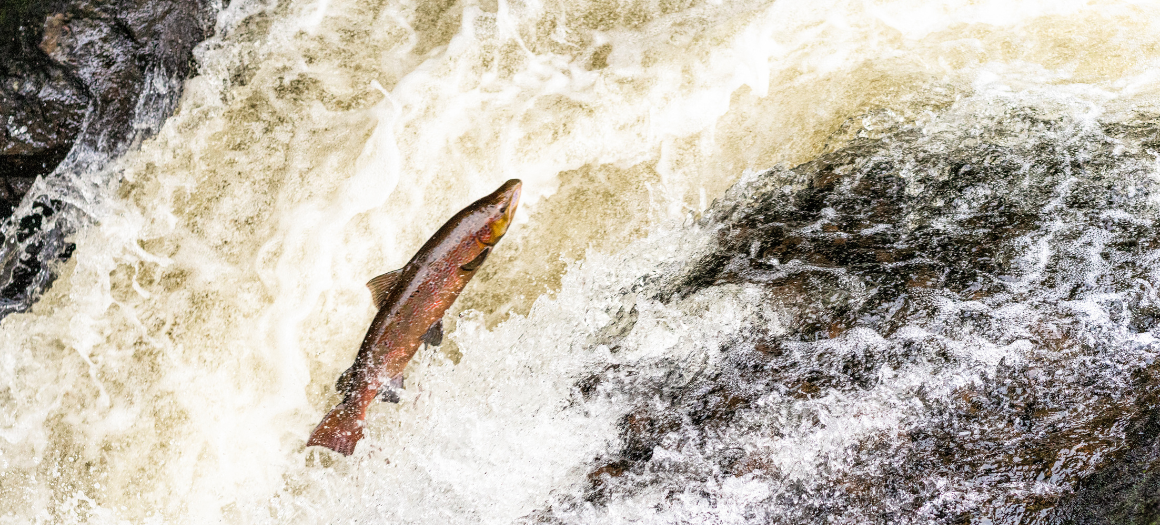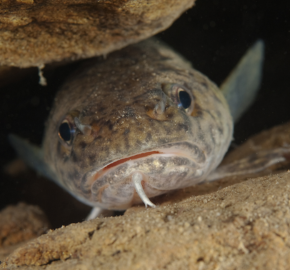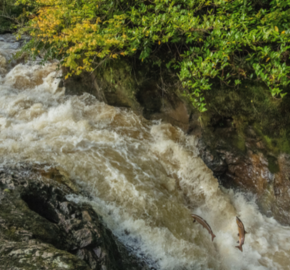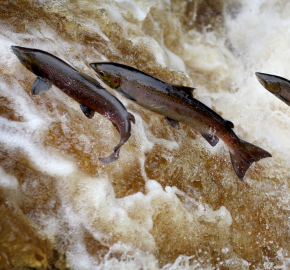Main UK population of Atlantic salmon move to endangered

In the species reassessment released today by the IUCN Red List of Threatened Species, the main UK population of Atlantic salmon are reclassified as endangered – meaning they are threatened with extinction. Global Atlantic salmon populations are reclassified from least concern to near threatened.
Put plainly, the UK is set to lose this iconic species first and before anywhere else unless urgent action is taken.
The reassessment indicates that the mechanisms to protect Atlantic salmon are not working and the regulators responsible for their protection are failing both the species and the habitats on which they depend.
WildFish is calling for urgent change to the protection afforded to Atlantic salmon and their habitats by enforcing the regulations that should protect their habitats from pollution, removing open-net salmon farms from Scottish waters and addressing in-stream barriers that inhibit their migration.
Atlantic salmon are one of a handful of species, called keystone species, which are vital to the habitats in which they live. Without them, their habitats would be dramatically different which in turn impacts all of the other species which depend on them, including us. Atlantic salmon are the ‘canary in the coalmine’ for our watery habitats, their endangered status in the UK highlights the dire state of aquatic habitats – our rivers, coastal zones and seas.
The main threats to the UK populations of Atlantic salmon come as no surprise. They include declining water quality, in-stream barriers, salmon farming, exploitation and climate change. We have known about these pressures for years and we know many solutions which will make a big difference to the salmon’s fate, yet successive UK governments have failed to act.
The UK salmon population is in crisis thanks to the failures of our government and its regulators. We should be ashamed that our salmon population is faring worse than globally.
Nick Measham
Chief executive, WildFish
Mr Measham continued: “Thanks to the money raised by our supporters, we commissioned IUCN to reassess the status of Atlantic salmon stocks across the world. This assessment is long overdue. The last attempt was 25 years ago. The outcome, although not unsurprising, is very grim. We need the government to give our regulators the mandate and resources to act urgently to save our Atlantic salmon and their rivers”.
We are at a crossroads, we either change direction or there is a very real possibility that we will lose this incredible fish in our lifetime and on our watch”.
Janina Gray
Head of science and policy, WildFish
Ms Gray continued:“Populations of Atlantic salmon here in the UK are at the frontline of the biodiversity crisis. Their unacceptable decline is the result of the catastrophic failure of our regulators to protect our aquatic environments from pollution, excessive removal of water, barriers and intensive fish farming.
Supporting Quotes
Jeremy Wade, television presenter and author: “As indicators of river health, Atlantic salmon are giving us a clear message – one that also has implications for human health down the line. The good news is that the trend is reversible, if we have the collective will to make it so”.
Marina Gibson, certified fishing instructor: “I first picked up a double-handed rod when I was 8 years old, in the hope that I would catch my first King of the River. And ever since, I have witnessed the decline in their population. Implementing conservation measures are crucial for the future of salmon populations. This includes sustainable fishing practices, habitat restoration, water quality management, climate change mitigation, and careful regulation of aquaculture operations to minimise impacts on wild populations. Collaborative efforts among governments, organisations, and communities are necessary to ensure the long-term survival and recovery of salmon populations. The most magnificent fish is in trouble and we need to act now”.
Jack Perks, wildlife filmmaker: “Atlantic salmon are increasingly becoming a very own panda here in British rivers with a worrying amount of pressures mounting on them but it’s not too late to turn the tide for this truly iconic fish if we act decisively and boldly”.
Matthew Wright, television presenter: “In my opinion big business, or more specifically corporate greed, is the greatest threat not just to Atlantic Salmon but to countless creatures. Centuries ago companies could use ignorance as an excuse for poisoning the environment – they didn’t know better. In these more enlightened times they use misinformation to keep the public and politicians in the dark but with salmon numbers collapsing to the point of extinction I’d like to think that game is up. The light of truth is penetrating the murky depths of offshore salmon farming and polluted, toxic rivers. Change will come”.
John Aitchison, Coastal Communities Network: “Wild Atlantic salmon swim thousands of kilometres to the Arctic and back, yet they return to exactly the same spot they came from. These amazing fish personify the connection between Scotland’s precious rivers and far distant oceans. I have filmed them several times, on their way home from the sea. Watching them trying again and again to leap up waterfalls, it is impossible not to be moved by their determination to reach the place they were born. Wild salmon are one of Scotland’s most iconic, inspiring animals but they face many problems, from climate change to the impact of sea lice from salmon farms and interbreeding with escaped farmed salmon. People have caused many of these problems, and they can be solved by people too. With wild salmon in crisis we must do everything we can to stop them becoming extinct in Scotland. That includes making and enforcing strict new rules about sea lice and fish farm escapes”.
Dr. Janina Gray, head of science and policy at WildFish: “Protecting salmon is symbolic of protecting the whole of nature. Without this species, connectivity between our various blue spaces is broken and life cannot function as it should.”
Dr. Richard Noble, senior research asssociate at the University of Hull: “Undertaking a regional Red List assessment for British freshwater and diadromous fishes was long overdue, as was updating the global IUCN-led assessment for salmon. Whilst undertaking the Natural England funded regional assessment, we recognised the importance of the regional assessment contributing to the global assessment, so our analysis also underpinned the UK sub-population component of the global assessment. Whilst the decline in salmon numbers has long been recognised, it is concerning that, despite extensive management and conservation measures, the current rate of decline means that this iconic species is assessed as Endangered in the UK and Near Threatened globally. This assessment reinforces that more needs to be done to protect this important species and their habitats for the future and the wider health of aquatic systems”.




I predominatly fish for many many years the spate River findhorn in the highlands and have in the last 5 -10 years notice year on year diseased fish and this year impaticularly the whole spring stock wiped out in my opinion due to no snow and high temperatures nothing to do with fish farms lice obstructions etc so im at a loss as thete is no measures possible to combat climate change it seems a lost cause now its so sad. 🥲🥲
It’s the Norwegians we have to blame mainly along with the SNP Scottish Government? When you look at the number of fish farms along the cost of Norway and that’s the area where our young salmon head to feed!!! They just don’t have any chance, leave in lice infested waters and go to lice infested to feed in the Norwegian Sea?
We need to put pressures on Norway as well as Scotland’s government.
We must do EVERYTHING we can Tae save this Iconic Scottish Fish. Starting with a Total ban of new Fish Farm Licences and thorough checks on existing ones. If they are breaking the law or are badly infested with lice CLOSE them down. Any farmed fish Must be noted so customers of fresh fish or restaurant can decide if they want to eat fish raised in such a barbaric manner. No Pussy footing around Do It NOW
It’s been well know on the scottish rivers for years that salmon are in major decline, nothing will get done until all the correct pockets are lined, the goverment have known for years about this and done nothing. Absolute disgrace.
Stop cruelty now evil 😈 has no place on this planet
It may just be possible to halt the critical decline in salmon stocks. BIG steps need to be taken at a substantial cost.
So far most steps have failed due to low enforcement rates on damage/rs and insignificant input.
Fish Farms should be on land and not in the sea, it would make massive differences in reducing disease and infections on our wild population.
Until the free for all blatant netting,for our salmon in the North Atlantic ceases feeding grounds is halted there is no hope.
Nasco who l think does nothing to address this problem is disgraceful or Defra our regulator. Ever since Russia Ukraine war kicked off our salmon runs have nose dived.
Trawlers that fished in Russian waters and Sold there catches in Russian ports became redundant, and now hitting salmon runs in N.Atlantic. unregulated free for all . Stan Edmondson Cumbria
The fish farms are the biggest cause of the problem coupled with the craven attitude of the Scottish government which has consistently failed to address the issues and enforce the law
The Scottish government has always taken the side of big business which is the primary perpetrator of the practices which are the principal issue
Things must change now, why should the likes of Mowi and other Norwegian concerns, be allowed to continue this filthy industry, millions of litres of hydrogen peroxide tipped into the lochs to combat lice , antibiotics in the pellets to combat disease, as there’s way too many Salmon in the cages nose to tail , akin to battery farming but worse .
If these FISH had hoofs and fur , there would be hell up! , the faeces under the cages , poisonous filth killing plants crabs shrimps etc , lice killing smolts on their first journey to the sea.lf Scottish Salmon dissapear so does its heritage, the Spey is the mecca for fly fishermen.Dessimate local economies, jobs, hotels , resteraunts tackle shops.
I am a fisherman for sport but not fly only fresh water so wouldn’t know the difference between Atlantic or Pacific and which one is legal and which one is not braking the law so I think all salmon fishing should be banned until stocks are back up and fish farms should be check every 3 months and cut the amount of fish farms .
Samon farming is having a devastating effect on the natural marine environment and wild Salmon populations and it must stop now.
I would like to know where you stand on the threatened pollution of the Test from the imminent threatened pumping of raw sewage into the Bourne and probably several other of the flooding winterbournes by Southern water as the water levels rise and their sewage pipes leak.
I would like to know the legality of this action and why the sewage cannot be pumped into adjacent fields to let the soil purify the water.
Thank you.
Hi Caroline, we certainly wouldn’t support this happening. We campaign against sewage pollution as a notable risk facing wild fish and their freshwater habitats.
Illegal fishing on the high seas is killing this species and many others. About 70% of high seas trawlers trawl with their AIS switched off. That tells us all we need to know.
Countless years of abstraction and pollution in English rivers endorsed firstly by incompetent local administrations in the 1950’s, then too by the later fishery boards, water boards, National Rivers Authority and finally the EA. The latter’s powers being emasculated by the State sons not to interfere with business, e.g. Teesport scheme and RAS aquaculture at Grimsby. I wouldn’t like to be in the Scot’s Govt when their rivers fail.
The usual suspects of money, greed, and ignorance I imagine. Around 8 billion human beings and counting, with collective needs and desires unchecked, the exploitation of resources for profit, without any long term vision, unfortunately it was only ever going to go one way. Now so many life forms are either gone or are threatened. We cannot just keep taking from nature that we are all a part of. The Native American people understood this, if man affects the universal web of life, in turn man will be affected also, and that’s what has happened. Without doubt we have all failed this and many other creatures, unless something is done the Atlantic Salmon will join an ever increasing list of what once was.